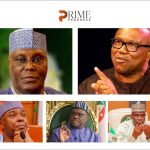Chinua Achebe, one of Africa’s finest writers, in his book, “The Trouble with Nigeria”, said the country’s problem has been squarely that of leadership failure since independence in 1960.
Since transiting to democratic governance in 1999, the fundamental problems of insecurity, corruption, extreme poverty, institutional failure, broken healthcare system, and inadequate power supply have remained unresolved.
When the current administration took over leadership in 2015, expectations were high because President Muhammadu Buhari rode to power as a presumed “disciplined and incorruptible leader” who could save Nigeria, drawing from his experience as a retired major-general and former head of state.
However, one year to the end of his eight-year (two-term) administration, the reality for most Nigerians is that the nation has taken many steps backwards as basic issues of corruption, poverty, and insecurity have worsened.
Between 2016 and 2020, Nigeria experienced two economic recessions under Buhari. Inflation has risen to 15.99% as of March 2022, up from 9.01% in 2015, resulting in the Naira losing more than 200% of its value as prices of essential food items continue to go skyward beyond the reach of most Nigerians, 39% of whom are already living in extreme poverty.
Analysts blame Buhari’s poor economic handling and failure to tackle institutional corruption and graft among his appointees.
Also, insecurity under Buhari has grown to alarming levels, including terrorists and bandits attacking military bases, passenger trains and vehicles and other public places. At a score of 8.8, Nigeria’s security threat is currently judged high.
The All Progressives Congress or APC, Buhari’s party, came to power with a promise of “Change”, following a nationwide outcry over the institutionalisation of corruption by the People’s Democratic Party or PDP that governed the country between 1999 and 2015.
2023 presents another opportunity for Nigerians to elect new sets of leaders at all levels of governance, and hitherto politically indifferent Nigerians seem to be interested in the 2023 general elections, given recent reforms that now allow for electronic transmission of results.
Electronic transmission of results means less human interference and free and fair elections to produce competent and determined leaders. Given the failure of the APC in the last seven years, it seems obvious that if the APC must win next year’s general elections and retain power at the centre, they must present a candidate with proven track records plus a tendency not to entertain corruption.
Several politicians in the APC have already declared interest in contesting in the party’s primaries for its presidential ticket on May 30/31. So who among them can Nigerians trust and why? Prime Progress analysed each aspirant, touching on what stands for and against them.
Bola Ahmed Tinubu
A former Lagos State governor (1999-2007), he was a crucial player in the formation of the APC in 2013. 70-yeah-old Tinubu has stamped his influence in Nigeria’s politics, playing a “kingmaker” role as an extreme godfather. His cronies are known to fill high offices in the country, especially in the southwest region and Lagos, where he has literally decided who becomes the governor since 2007. He nominated the current vice president, Yemi Osinbajo, as running mate to Buhari in 2015.
His supporters believe that he has paid his dues in APC and Nigerian politics and should be backed by the ruling party for the 2023 race.
However, some Nigerians have raised concerns over his health status to avoid a repeat of the current situation where the incumbent has spent over 200 days on medical tourism in the United Kingdom, costing billions of public funds. Tinubu has recently travelled abroad severally for medical reasons.
Some believe Tinubu is highly corrupt as the source of his wealth remains contentious. He owns several big businesses and properties in Nigeria, especially in Lagos, many of which he never had until he became governor in 1999. He is believed to have personalised the Lagos tax system through Alpha-beta, a consulting firm he founded to compute, track, and reconcile Lagos’ internally generated revenue for commission.
On the eve of the 2019 general elections, bullion vans were seen transporting cash believed to compromise the integrity of the election in Lagos into his home. Many Nigerians are afraid of Tinubu’s all-controlling character, and the larger population do not want another leader who would jettison democratic principles enthroning his will against them.
Yemi Osibanjo
One of Tinubu’s political protégés, having served as Lagos attorney general under Tinubu, Vice President (VP) Osibanjo is one of the strongest contenders for APC’s ticket.
The Senior Advocate of Nigeria’s admirers say he has a thorough understanding of the nation’s many challenges, having served as VP for seven years. They say he is strong-willed, pointing to necessary but difficult decisions he took as acting president while Buhari was on a medical vacation to the UK. That includes sacking Lawal Daura, a relative of Buhari who was director of the State Security Service or SSS, for sending SSS officials to illegally besiege the Senate building in Abuja.
They also believe that the law professor’s erudition and speech delivery would make him a president Nigerians would be proud of. But Nigeria’s problems are beyond speeches and scholarly prowess.
In Nigeria, the VP leads the economic planning team. So how does he explain to Nigerians that he spearheaded the country’s economic team in the last seven years, and the nation has emerged as the world poverty capital with 39% of the population living in extreme poverty?
And his declaration speech, in which he suggested he would be ‘consolidating’ on Buhari’s “achievements”, has not been well received in some quarters because they think the president has failed and consolidating on failure means more suffering for citizens. The VP’s silence on human rights abuses under Buhari’s administration is another thing some Nigerians hold against him.
Rotimi Amaechi
Former Rivers State governor and current minister of transportation, Amaechi was two-time director-general of Buhari’s campaign committee. His political credentials are something other contenders may not want to look down on. He has demonstrated strong loyalty to Buhari and is believed to enjoy the backing of some top politicians in Buhari’s northern Nigeria.
But Ameachi’s support base in the south is lean. Some southerners say he has only been a Buhari puppet who cannot be exonerated as a cabinet member from the maladministration of the current government, especially as he has largely been silent on the excesses of his boss on human rights abuses, corruption and economic mismanagement.
Yahaya Bello
The current Governor of Kogi State argues that the north-central part of the country has yet to produce a president or vice since 1999, so he deserves support. But his poor performance and failure to pay workers their salaries pit him against the people.
David Umayi
The Ebonyi State governor, who decamped from the PDP to the ruling party, has become a reference point for politicians in Nigeria for his massive infrastructural development and other face-lifting projects in Ebonyi. He appears to be one APC aspirant with a near clean sheet given his achievements.
Others
Other APC aspirants include former Abia State governor, Orji Uzor Kalu; former Imo State governor, Rochas Okorocha; and current minister of labour, Chris Ngige. But these three are widely believed to be corrupt, with Kalu and Okorocha facing corruption-related charges for allegedly embezzling billions of Naira as governors.
Conclusion
These aspirants say they would build on Buhari’s “achievements” if they become president. Only one of them would emerge as APC’s flag bearer to face the opposition in the election. Nigerians will have to decide if that APC candidate deserves their vote and whether they want consolidation on what they think has been a failure or want something entirely fresh.
If you have not registered for your permanent voter’s card, go here.






